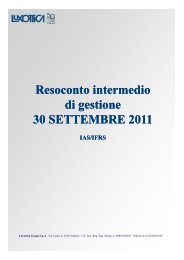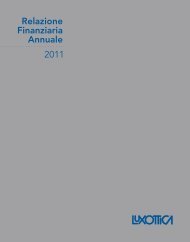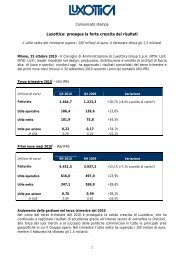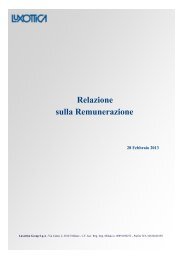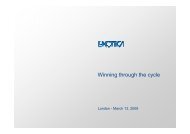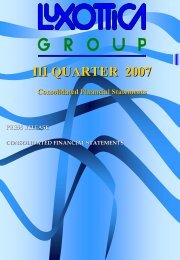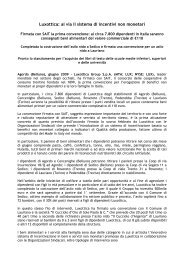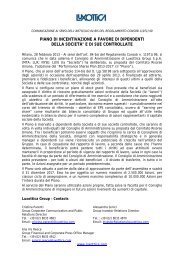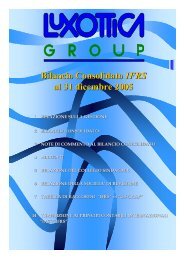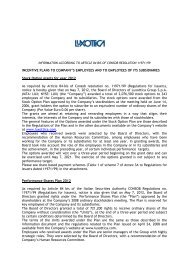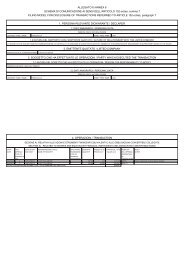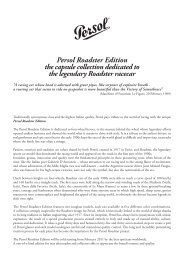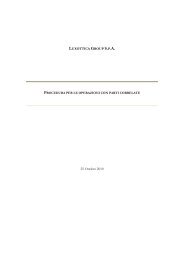Annual Review 2012 - Luxottica
Annual Review 2012 - Luxottica
Annual Review 2012 - Luxottica
You also want an ePaper? Increase the reach of your titles
YUMPU automatically turns print PDFs into web optimized ePapers that Google loves.
Consolidated financial statements - NOTES<br />
| 117 ><br />
IFRS 9 introduces new requirements for classifying and measuring financial assets. The<br />
new standard reduces the number of categories of financial assets pursuant to IAS 39<br />
and requires that all financial assets be: (i) classified on the basis of the model which a<br />
company has adopted in order to manage its financial activities and on the basis of the<br />
cash flows from financing activities; (ii) initially measured at fair value plus any transaction<br />
costs in the case of financial assets not measured at fair value through profit and loss;<br />
and (iii) subsequently measured at their fair value or at the amortized cost. IFRS 9 also<br />
provides that embedded derivatives which fall within the scope of IFRS 9 must no longer<br />
be separated from the primary contract which contains them and states that a company<br />
may decide to directly record - within the consolidated statement of comprehensive<br />
income - any changes in the fair value of investments which fall within the scope of IFRS 9.<br />
The endorsement process of IFRS 9, that should be effective starting from January, 1 2013,<br />
has been suspended. The Group is assessing the full impact of adopting IFRS 9.<br />
IFRS 10 - Consolidated Financial Statements, issued in May 2011. The new model replaces<br />
the current duality of IAS 27 and SIC12. The standard states that an investor, regardless of<br />
the nature of its involvement with an entity (the investee), shall determine whether it is a<br />
parent by assessing whether it controls the investee. An investor controls an investee if and<br />
only if the investor has (i) the power over the investee, (ii) exposure, or rights, to variable<br />
returns from its involvement with the investee and (iii) the ability to use its power over the<br />
investee to affect the amount of the investor’s returns.<br />
IFRS 10 defines relevant activities as activities of the investee that significantly affect the<br />
investee’s returns. Based on the new standard (i) power arises from rights (for the purpose<br />
of assessing power, only substantive rights are considered), (ii) there are possibilities of<br />
having power with less than 50 percent of voting rights, and (iii) potential voting rights are<br />
considered only if they are substantive, differently from IAS 27, under which only potential<br />
voting rights that are currently exercisable or convertible were relevant to determining<br />
control. The new standard introduces some factors to identifying whether a party is acting<br />
as an agent or a principal.<br />
Concurrently with IFRS 10 the IASB issued in May 2011 IAS 27 - Separate Financial<br />
Statements, which prescribes the accounting and disclosure requirements for investments<br />
in subsidiaries, joint ventures and associates when an entity prepares separate financial<br />
statements. IFRS 10 and IAS 27 supersede IAS 27 - Consolidated and separate financial<br />
statements (as amended in 2008).<br />
For IFRS 10 and IAS 27 the IASB indicated January 2013 as the effective date. The European<br />
Commission endorsed the two standards on December 11, <strong>2012</strong> with regulation number<br />
1254 and postponed by one year the original effective date set by the IASB. The standards<br />
are now effective for annual periods beginning on or after January 1, 2014 at the latest. The<br />
Group assessed that the application of the new standard will not have a significant impact<br />
on its consolidated financial statements.<br />
IFRS 12 - Disclosure of Interests in Other Entities, issued in May 2011. IFRS 12 provides<br />
expanded disclosures about an entity’s interests in subsidiaries, associates and joint<br />
arrangements. IFRS 12 moves away from requiring a ‘boiler plate’ list of disclosures to<br />
a more principles based approach. IFRS 12 applies only to the consolidated accounts.



